Astronomers discover six
new planets
 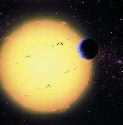
|
Astronomer Steven Vogt and his collaborators, including alumnus
Geoffrey Marcy, have discovered six new planets outside our solar
system. In addition, the researchers have uncovered evidence suggesting
that two previously discovered planets (depicted in the illustrations,
above) have companions orbiting the same star. Photos:©Lynette
Cook |
The world's most prolific team of planet hunters has found six new
planets orbiting nearby stars, bringing the total number of planets
astronomers have detected outside the solar system to 29. The researchers
also found evidence suggesting that two previously discovered planets
have additional companions, said Steven Vogt, UCSC professor of astronomy
and astrophysics.
Vogt and his colleagues, UCSC alumnus Geoffrey Marcy, now of UC Berkeley,
Paul Butler of the Department of Terrestrial Magnetism at the Carnegie
Institution of Washington, D.C., and Kevin Apps of the University of
Sussex, England, made the discoveries using the "HIRES" spectrometer
on the Keck I Telescope in Hawaii. Their findings will be published
in the Astrophysical Journal.
The researchers have been using the facilities at the W. M. Keck Observatory
for the past three years to conduct a survey of 500 nearby sunlike stars
in search of planets. The project is supported by the NASA Origins Program,
which has provided both funding and telescope time, and by the National
Science Foundation.
The six new planets increase by about 25 percent the number of known
"extrasolar" planets, giving astronomers a substantial amount of additional
information about planetary systems, Vogt said. One of the planets,
HD 192263, was also recently detected by Nuno Santos and collaborators
in Geneva, Switzerland, who reported it while Vogt and his colleagues
were preparing their paper.
Plans moving ahead on UCSC regional center
As the academic planning process gets under way to establish a UCSC
regional
center in the Santa Clara Valley, faculty and administrators are working
together to embrace the opportunities and address the challenges that
face the campus as it seeks to become the "UC of Silicon Valley."
During an Academic Senate forum on the regional center in November,
Executive Vice Chancellor and Campus Provost John Simpson announced
the formation of an academic planning committee that will develop a
framework for the academic activities associated with the center.
Plans for the new UCSC facility have progressed since the idea was
first proposed by members of the Millennium Committee. Since then, a
task force has assessed UCSC activities in the region with an eye toward
building on strengths and satisfying unmet needs.
A regional center would augment and enhance the offerings of the main
campus by providing research, teaching, and community service opportunities
for UCSC faculty, students, and staff, while also raising UCSC's profile
in the region. A site analysis is under way.
"In Silicon Valley, what we have to offer complements alliances and
affiliations that will be valuable for faculty, researchers, and students,"
said Chancellor M.R.C. Greenwood.
Adaptive optics center will be based at UCSC
UCSC has been selected to lead a multi-institutional partnership to
advance the field of adaptive optics, which promises to revolutionize
astronomy and vision science.
The National Science Foundation's governing body, the National Science
Board, has approved a proposal to establish a Center for Adaptive Optics
at UCSC. The multi-institutional center will coordinate the efforts
of researchers across the country involved in the field of adaptive
optics.
The Center for Adaptive Optics is one of five National Science Foundation
science and technology centers approved this past year. NSF guidelines
allow for commitments of up to $20 million over five years.
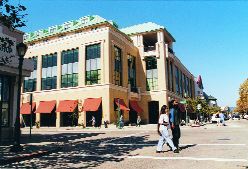 |
Town and Gown Chancellor Greenwood
and representatives from the city of Santa Cruz came together in
November to dedicate the University Town Center, above. The new
five-story building is located in the heart of downtown Santa Cruz
on the site of the former Ford's Department Store, which was destroyed
in the 1989 Loma Prieta earthquake. The new building provides space
for UCSC programs as well as for private retailers and other businesses.
Those from UCSC using the building include UCSC Extension. The top
two floors provide 54 residential apartments for regularly enrolled
UCSC students and students in extension's English. Photo: Barbara
McKenna |
Primitive flowering plants live at UCSC
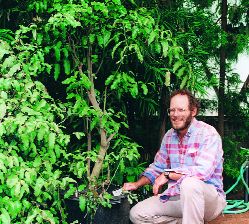 At
the international Botanical Congress in St. Louis last summer, a team
of researchers presented genetic evidence that the most primitive
living flowering plant is an obscure species called Amborella trichopoda.
For botanists wanting to study Amborella, there is only one place in
the U.S. that can provide specimen material: the UCSC Arboretum. At
the international Botanical Congress in St. Louis last summer, a team
of researchers presented genetic evidence that the most primitive
living flowering plant is an obscure species called Amborella trichopoda.
For botanists wanting to study Amborella, there is only one place in
the U.S. that can provide specimen material: the UCSC Arboretum.
Amborella, a small shrub with tiny greenish-yellow flowers and red
fruit, grows in the wild only on the South Pacific island of New Caledonia.
Virginia and Todd Keeler-Wolf traveled to New Caledonia
in 1975 when they were students at UCSC and, under founding Arboretum
director Ray Collett's guidance, shipped back some samples of Amborella.
Photo: Tim Stephens
UCSC historian appointed to NEH
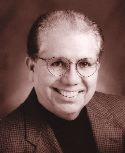 A
UCSC historian is one of five people to be named by President Clinton
to serve on the 26-member board of the National Endowment for the Humanities. A
UCSC historian is one of five people to be named by President Clinton
to serve on the 26-member board of the National Endowment for the Humanities.
Pedro Castillo, an associate professor of history, was select-ed to
serve on the National Council on the Humanities, the advisory board
of the National Endowment for the Humanities (NEH). The national council
advises NEH Chairman William Ferris on policies and programs and grant
allocations. Members serve six-year terms.
Castillo is well prepared for his new duties, having served as a member
of the California Council for the Humanities. Among his priorities as
a council member will be to support research in nontraditional subject
areas examining such issues as race, class, and gender.
Castillo is cofounder and a former director of UCSC's Chicano/Latino
Research Center. His teaching and research focus on the history and
politics of Mexican Americans in the United States.
His most recent book is The American Nation, a textbook on American
history that has been adopted by a number of school districts for their
junior high school curricula.
Alumna named state's professor of year
Julie glass, a mathematics instructor at California State University,
Hayward, who received her master's degree and Ph.D. in mathematics from
UCSC, has been named the 1999 California Professor of the Year by the
Carnegie Foundation for the Advancement of Teaching.
Glass, 32, has been an assistant professor at CSU Hayward since 1994.
She hosts a cable television program devoted to college algebra, has
authored math-oriented children's books, and is cofounder of a math
and science day camp for school-age girls. She teaches two courses at
CSU Hayward: introduction to proofs and math for business and social
scientists.
Glass has appeared on two programs on the university's television station:
Math on TV, a video course to help high school students prepare for
math placement exams; and College Algebra, a course offered for credit.
|
Since 1971, Slide Collections in the University Library has been
the home of the archive of photographer Branson DeCou. But, because
DeCou produced mainly lantern slides, the delicate and dated format
of the slides (imprinted on glass and twice as big as 35-mm slides)
made them impractical for general use. Now, the DeCou slides are
going from obsolete to cutting edge in one fell swoop, thanks
to a grant from a New York foundation. The $14,000 grant comes
from the Gladys Krieble Delmas Foundation and will fund the purchase
of a state-of-the-art slide scanner and the scanning, researching,
and cataloguing of 1,000 of the 10,000 DeCou slides in the collection.
The slides are ones that portray life in Italy, a special area
of interest for the Delmas Foundation.
Photo: Branson Decou
|
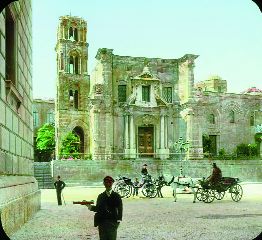
|
Electrical engineer receives $625,000 Packard
fellowship
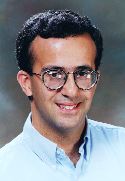 Ali
Shakouri (Photo: Victor Schiffrin) Ali
Shakouri (Photo: Victor Schiffrin)
For the sixth consecutive year, a UCSC researcher has garnered one
of the nation's most prestigious honors for young faculty members: a
David and Lucile Packard Fellowship for Science and Engineering, worth
a total of $625,000.
Ali Shakouri, an assistant professor of electrical engineering in the
Jack Baskin School of Engineering, will receive $125,000 per year for
the next five years to support his pioneering research on semiconductor
physics and optical communication systems. The Packard Foundation awards
these fellowships to young scientists and engineers who show exceptional
promise and creativity.
Shakouri's research on the electrical, optical, and thermal properties
of semiconductors has many potential applications, such as improving
the performance of electronic devices, increasing the speed of fiber-optic
networks, and developing novel devices with new functions and applications.
The Packard Fellowship program is intended to provide support for unusually
creative science and engineering researchers early in their careers.
Ali Akbar Khan accepts UCSC post
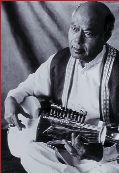 Sarod
master Ali Akbar Khan, considered to be one of the world's greatest
living musicians, has been named distinguished adjunct professor of
music at UC Santa Cruz. A "national living treasure" of India,
Khan is regarded as the most accomplished interpreter of Indian classical
music alive today. Khan accepted his UCSC appointment in September.
His first formal activity with UCSC was a public concert in the Music
Center Recital Hall in October. "We feel very privileged
to have the opportunity of collaborating with such an extraordinary
artist," said Edward Houghton, dean of the Arts Division. "Khansahib
is not only an outstanding musician and dedicated teacher but also the
heir and principal exemplar of a long and distinguished musical tradition.
He will be a remarkable resource for our students and for our expanding
programs in the arts and cultures of India." Sarod
master Ali Akbar Khan, considered to be one of the world's greatest
living musicians, has been named distinguished adjunct professor of
music at UC Santa Cruz. A "national living treasure" of India,
Khan is regarded as the most accomplished interpreter of Indian classical
music alive today. Khan accepted his UCSC appointment in September.
His first formal activity with UCSC was a public concert in the Music
Center Recital Hall in October. "We feel very privileged
to have the opportunity of collaborating with such an extraordinary
artist," said Edward Houghton, dean of the Arts Division. "Khansahib
is not only an outstanding musician and dedicated teacher but also the
heir and principal exemplar of a long and distinguished musical tradition.
He will be a remarkable resource for our students and for our expanding
programs in the arts and cultures of India."
"This is a very unique collaboration between the university and my
college," Khan said. "I'm very happy we will be working together. In
my family, the knowledge and tradition of this music is very important,
and I want to be able to pass that on to future generations."
Photo: Lawson Knight
Marine center prepares for March opening
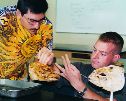
Students Birru Morgan and F. Blaine Rhobotham examine fish skulls
in the center's teaching lab. (photo: Tim Stevens)
The seymour center at Long Marine Laboratory is buzzing with activity
as the new public education center prepares for its grand opening in
March. The installation of aquariums and exhibits is under way, staff
have moved into the office space, and marine biology classes are using
the facility's new teaching laboratory.
The Seymour Center will enable Long Marine Lab to greatly expand its
popular public education programs. With exhibits focusing on the work
of researchers at the Institute of Marine Sciences, which operates Long
Marine Lab, the center will give schoolchildren and the general public
a unique view into the workings of a world-class marine research laboratory.
"This is a very exciting time now that all the pieces are starting
to come together," said Seymour Center director Julie Barrett Heffington.
Private donations funded nearly all of the project's $6.25 million
cost, including a cornerstone contribution from H. Boyd Seymour Jr.
of San Francisco. Seymour's gift of $2 million honors his father, Harry
Boyd Seymour, and his grandfather, Arthur McArthur Seymour. Numerous
other individuals and foundations made significant gifts.
The exhibits and aquariums at the Seymour Center will have a very different
look and feel from those at other public aquariums, such as the Monterey
Bay Aquarium. The emphasis will be on scientists and how they study
the ocean, Heffington said. The exhibit space will look something like
a research laboratory, and interactive stations will provide "hands-on"
experiences.
Academic Senate debates 'narratives'
Meeting in December, UCSC's Academic Senate postponed a vote on the
campus's traditional Narrative Evaluation System (NES). The senate,
voting 8079, moved the matter to its Committee on Educational
Policy (CEP) and Graduate Council for consideration.
The meeting was prompted by a petition signed by more than 170 members
of the senate who recommended that the NES be replaced by the conventional
UC grading system. "The Narrative Evaluation System has an honorable
history, but times have changed and a new approach to grading is required,"
the petitioners said. The discussion over NES continued in
January, as several campus forums on the matter were scheduled to take
place.
George Brown, CEP chair, said a report on his committee's evaluation
of the 35-year-old tradition would be forthcoming at the February 23
meeting of the senate..
UCSC leads effort to offer AP courses online
In an effort to reach out to California high school students who can't
take advanced placement courses at their own school, UC Santa Cruz is
leading a systemwide effort to make AP courses available online to students
around the state.
Dozens of public high schools in the state offer no advanced placement
(AP) courses at all, and many offer four or fewer AP courses, according
to Elaine Wheeler, project director of UC's College Prep Initiative
(UCCP). The goal of the program is to make AP course materials available
to students who would otherwise have no access to them.
The UCSC-based distance learning project began in fall 1998 with a
pilot effort that reached 64 students in 14 schools. In fall 1999, the
program expanded to about 200 students in seven counties: San Diego,
Imperial, Merced, Fresno, Santa Cruz, Mariposa, and Santa Clara. Francisco
Hernandez, vice chancellor for student affairs at UCSC, came up with
the idea of using the Internet to help fill the gap in course offerings
at schools around the state. "This is an efficient and cost-effective
way to deliver AP and college prep classes," said Hernandez, who continues
to lead the proj-ect. "Other campuses are eager to sponsor similar programs,
but UCSC has emerged as the systemwide leader."
UC President Richard C. Atkinson provides $400,000 a year in ongoing
support, and the state legislature recently approved an additional $3
million for the one-time development of additional courses and $1 million
in ongoing funds for implementation and dissemination on a broader scale.
The project has the potential to reach thousands of students around
the state who would otherwise lack the opportunity to take AP classes.
Those courses can boost a student's grade-point average and enhance
his or her application when applying to the University of California.
In Memoriam
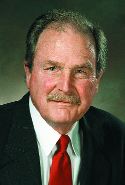 David
A. Huffman, the founding faculty member of UCSC's Computer Science Department
and a pioneer in the field, died at a Santa Cruz hospital in October
after a ten-month battle with cancer. He was 74. David
A. Huffman, the founding faculty member of UCSC's Computer Science Department
and a pioneer in the field, died at a Santa Cruz hospital in October
after a ten-month battle with cancer. He was 74.
Huffman is probably best known for the development of the Huffman Coding
Procedure, the result of a term paper he wrote while a graduate student
at the Massachusetts Institute of Technology. "Huffman
Codes" are used in nearly every application that involves the compression
and transmission of digital data, such as fax machines, modems, computer
networks, and high-definition television.
In 1967, he came to UCSC as the founding faculty member of the Computer
Science Department. He played a major role in the development of the
department's academic programs and the hiring of its faculty, and served
as chair from 1970 to 1973. He retired in 1994, but remained active
until recently as an emeritus professor, teaching information theory
and signal analysis courses.
A memorial service for David Huffman took place on campus in October.
Photo: UCSC photo services
Alumni Association names award winners
|
A biology professor, the department assistant for women's studies,
and an alumnus who was an environmental biologist defending
the human rights of indigenous people in Colombia have won the
top awards given annually by UCSC's Alumni Association.
Barry Bowman, Nicolette Czarrunchick, and Terence Unity Freitas,
the first person to receive an association award posthumously,
were nominated by students, alumni, faculty, and staff; the three
were selected by the UCSC Alumni Association Council.
At press time, they were scheduled to be honored at a luncheon
on campus on February 5.
Barry Bowman, a biology professor, won the Distin-guished
Teaching Award. Current and former students and colleagues characterized
Bowman as a supportive, yet challenging, mentor to junior faculty,
undergraduates, and graduate students.
Nicolette Czarrunchick, who won the Outstanding Staff Award
and has worked for the Women's Studies Department as manager for
15 years, was praised for her "unfailing empathy, enthusiasm,
and expertise."
Terence Unity Freitas, a 1997 B.A. recipient
in biology and environmental studies, won the Alumni Achievement
Award for his work with the U'wa people of Colombia. Freitas was
a key activist who tried to halt the plans of Shell Oil Company
and Occidental Petroleum to drill in U'wa territory. He helped
establish the U'wa Defense Working Group, a coalition of several
environmental organizations.
Last winter, while work-ing with the U'wa to set up a culturally
appropriate school, Freitas and two other Americans were kidnapped
and killed by Colombia's largest rebel group.
|
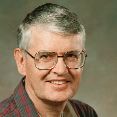 Barry Bowman
Barry Bowman
Photo: Don Harris
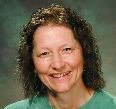 Nicolette
Czarrunchick Nicolette
Czarrunchick
Photo: Don Harris
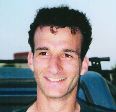 Terence Freita
Terence Freita
Photo: courtesy of Julie Freitas
|
|

